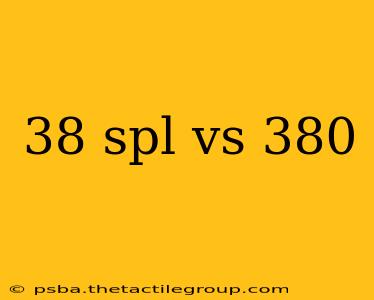Choosing the right caliber for self-defense or target practice can be daunting. Two frequently compared cartridges are the .38 Special and the .380 ACP (Automatic Colt Pistol). While both are relatively small, they offer distinct advantages and disadvantages. This in-depth comparison will help you understand the key differences and determine which might be better suited for your needs.
Caliber Basics: .38 Special vs .380 ACP
Before diving into the specifics, it's crucial to understand the fundamental differences between these two calibers. The .38 Special is a revolver cartridge, meaning it's designed for revolvers – firearms with a revolving cylinder. The .380 ACP, on the other hand, is a semi-automatic pistol cartridge, meaning it's intended for semi-automatic pistols that use a magazine to feed ammunition. This inherent difference influences many other aspects of their performance and suitability.
Ammunition Capacity: A Significant Difference
One of the most immediately noticeable differences lies in ammunition capacity. Revolvers chambered in .38 Special typically hold 5 or 6 rounds, while semi-automatic pistols in .380 ACP can hold anywhere from 6 to 10 rounds or more, depending on the magazine size. This higher capacity offers a clear advantage in self-defense situations where multiple shots might be necessary.
Recoil and Shootability: A Matter of Personal Preference
Recoil is a subjective experience, but generally, the .38 Special delivers a noticeably sharper recoil than the .380 ACP. This is largely due to the .38 Special's heavier bullet weight and higher velocity. While manageable for experienced shooters, the .38 Special's recoil can be more challenging for beginners or those with smaller hands. The .380 ACP, being lighter and slower, offers a gentler recoil, making it more comfortable for practice and potentially better for those new to firearms.
Stopping Power: A Complex Issue
This is a frequently debated topic, and the answer isn't straightforward. Stopping power depends on various factors beyond just caliber, including bullet weight, bullet type (hollow point, full metal jacket, etc.), shot placement, and the individual's physiology. While the .38 Special generally delivers more kinetic energy, meaning more potential to stop an attacker, the .380 ACP, with proper ammunition selection, can also be effective. Ultimately, shot placement is paramount. A well-placed shot from a .380 ACP can be far more effective than a poorly placed shot from a .38 Special.
Availability and Cost: Considerations for Budget and Accessibility
Both .38 Special and .380 ACP ammunition are widely available, but prices can fluctuate. Generally, .380 ACP ammunition tends to be slightly less expensive, though this can vary depending on the manufacturer, retailer, and current market conditions.
Which Caliber is Right for You?
The best caliber depends entirely on your individual needs and preferences. Here's a breakdown to aid your decision:
.38 Special: Ideal for…
- Experienced Shooters: Those comfortable handling more significant recoil.
- Revolver Enthusiasts: Those who prefer the reliability and simplicity of revolvers.
- Situations Requiring Maximum Stopping Power (with appropriate ammunition): While shot placement remains key, the .38 Special offers a greater potential for stopping power than the .380 ACP.
.380 ACP: Ideal for…
- Concealed Carry: Smaller, lighter pistols chambered in .380 ACP are often easier to conceal than larger .38 Special revolvers.
- Beginners: The reduced recoil makes it easier to learn and practice with.
- Those Seeking Higher Ammunition Capacity: Semi-automatic pistols offer a significant advantage in rounds carried compared to revolvers.
Conclusion: Informed Decision Making
Ultimately, the choice between .38 Special and .380 ACP comes down to your priorities. Carefully consider your experience level, intended use (self-defense, target shooting, etc.), comfort level with recoil, and personal preferences. It's always recommended to handle and fire both calibers, if possible, before making a final decision. Consult with a firearms expert or experienced shooter for personalized advice. Remember, responsible gun ownership includes thorough training and safe handling practices.

